Kenya
Kenyans largely ignored an opposition call to go on strike on Monday, re-opening shops and returning to work as they shrugged off demands for demonstrations against President Uhuru Kenyatta’s re-election and against the killing of protesters.
Cars, buses and motorcycles returned to the streets of the capital, Nairobi, and the western town of Kisumu after days of inactivity due to fears of violence after last Tuesday’s vote, in which Kenyatta beat rival Raila Odinga by securing more than 54 percent of the vote, according to official results.
A Kenyan human rights group said 24 people had been shot dead by police since election day. The government put the number of dead at 10, and said they died “in the course of quelling riots and unlawful assembly”. All deaths would be investigated, it added.
Allegations by Odinga of widespread electoral fraud have raised tensions in the East African country, where some 1,200 people were killed and 600,000 displaced in widespread ethnic violence after he lost the 2007 election to Mwai Kibaki.
Relief at the relatively muted protests this time, along with the re-election of a leader seen as pro-business and pro-growth, helped the stock market rise 2.5 percent on Monday. Shares have now climbed nearly 7 percent since the eve of the Aug. 8 election.
In Kibera, Nairobi’s biggest slum, where opposition support is strong, many residents appeared to be observing the strike but minibuses wove their way through the rubble-strewn streets, and some food stalls and phone and money outlets had opened.
Ken Nabwere, a Nairobi resident, said he had little choice but to return to work even though he supported the opposition National Super Alliance (NASA) coalition which called the strike.
“I was supposed to vote and (leave) the rest to the politicians because if I was to boycott work today those guys don’t pay my bills,” he told Reuters. “I would advise others that unless you have permission from your boss, then you better go to work.”
“NO WORK, NO FOOD”
Kenya, a country of 45 million people, provides the economic motor of East Africa. International observers said the vote was largely fair and a parallel tally by domestic monitors supported results that showed Kenyatta had won by a margin of 1.4 million votes.
But protests have erupted in opposition-supporting areas of Nairobi and Kisumu, where Odinga has strong support. The Kenya Red Cross said on Monday it had treated 170 people, of whom 108 had serious injuries, since the election.
Kenyatta reiterated an appeal for the opposition to shun violence and take any complaints to court.
“I truly believe there is no single Kenyan anywhere who wants to see violence, looting and demonstrations that end up destroying property,” he said.
He also urged police to exercise restraint.
The opposition has ruled out going to court and says it will announce its strategy on Tuesday.
“They should tell people to go back to work and wait for their next move,” said university lecturer Samuel Mukoma.
Diplomats have piled pressure on Odinga to either concede or take his challenge to court. A spokesman for China’s foreign ministry on Monday offered its congratulations to Kenyatta.
Many in the Kibera quarter of Nairobi were backing NASA’S strike call. “It’s only a small portion of people who are working. People need food and money,” said 32-year-old community health volunteer Thomas Ogoni.
A small group of young men lit a fire of tyres and planks at a busy junction and danced round the flames. Nearby, a dozen women dressed in black and holding candles were sitting in the middle of road in a small peace vigil.
Business activity had largely resumed in Kisumu, with some supermarkets open and motorcycle taxi operators out and about. Civil servants also returned to their desks.
Some opposition supporters said they remained determined to overturn the result but, for many, the priority was earning some money after days of inactivity.
“No work, no food,” said Eric Wanjero, a motorcycle driver looking for passengers. “Business is disrupted still but I had to go out (today) and try to make my living.”
REUTERS



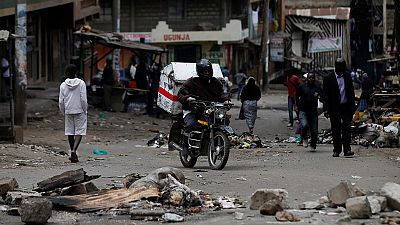

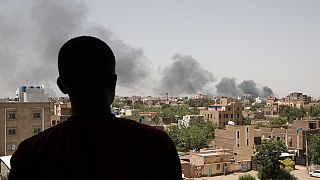


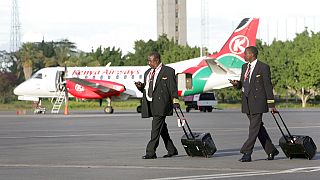

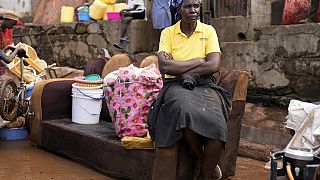
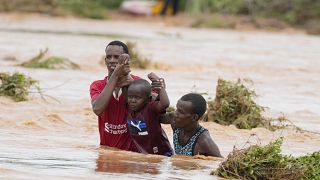
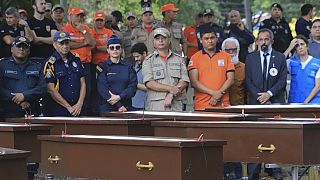
01:02
Pics of the day: April 25, 2024
01:35
Kenya: Local anti malaria drug production signals progress
01:02
Pics of the day: April 24, 2024
01:40
Nairobi residents grapple with floods aftermath
02:29
"Efficient food systems key to tackling food waste", UNEP programme manager
01:02
Pics of the day: April 23, 2024